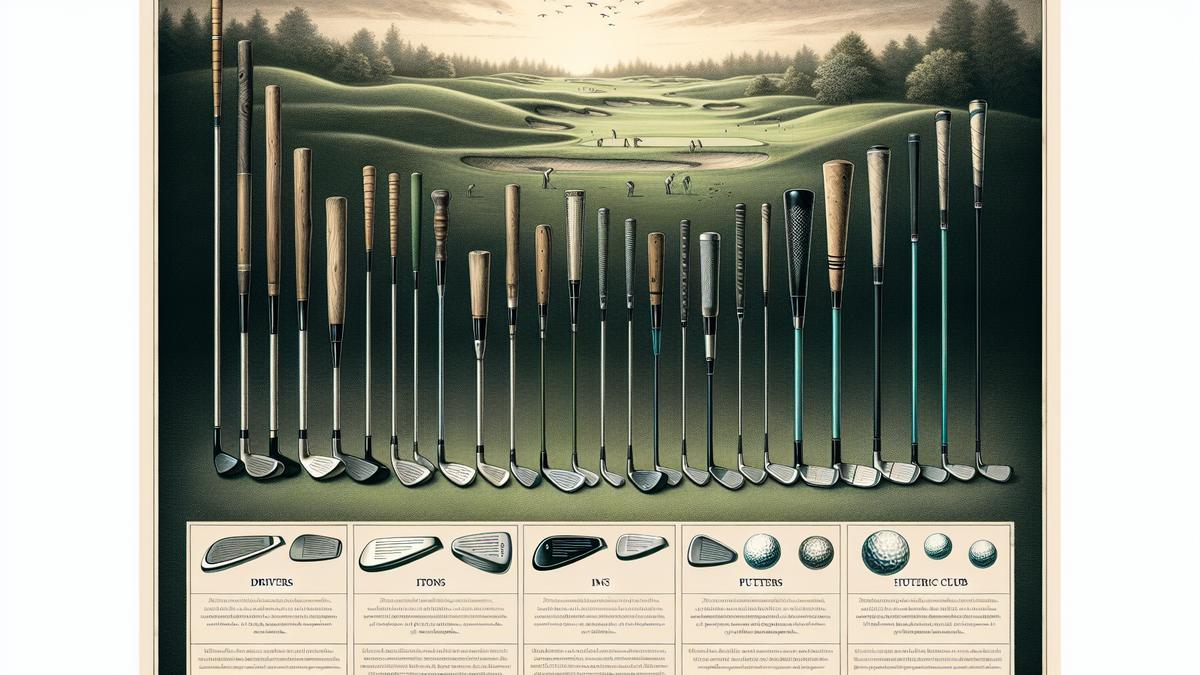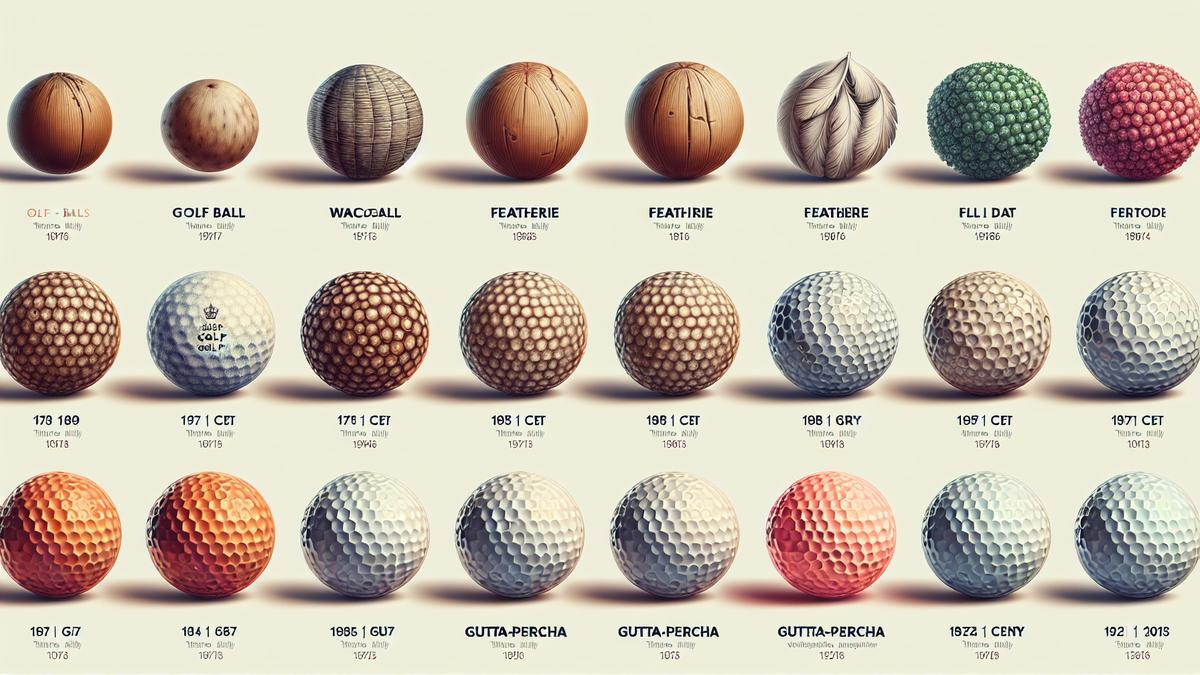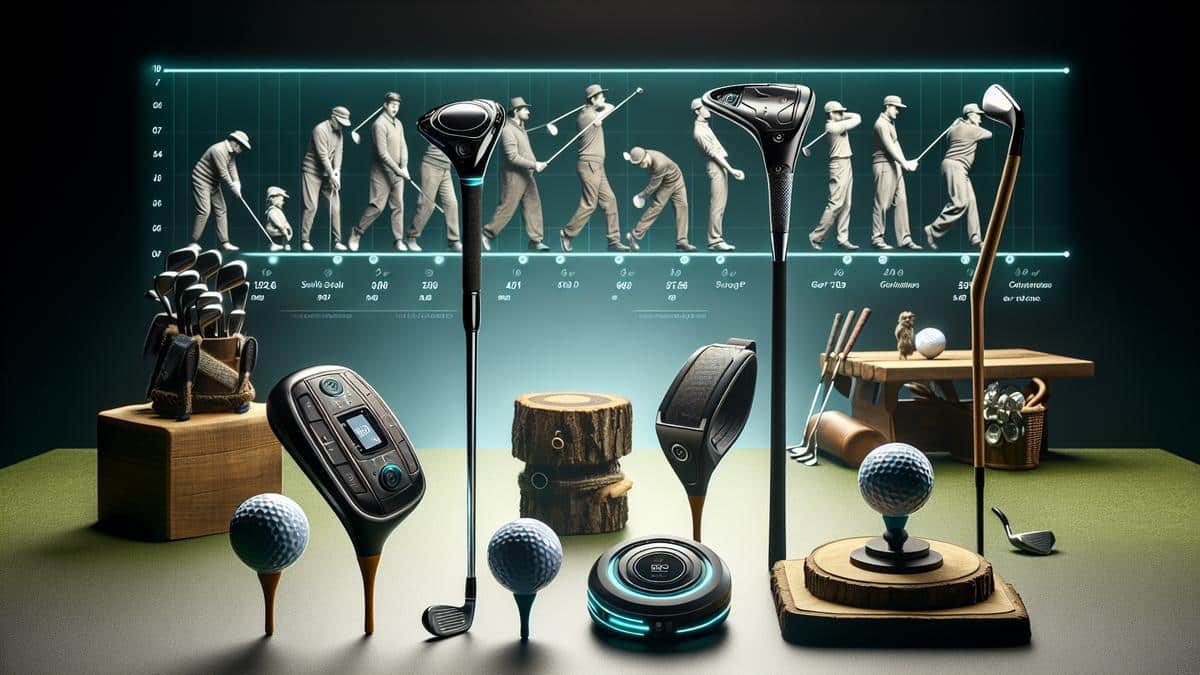The evolution of golf equipment is a fascinating journey through time! Get ready to dive into the rich history of golf clubs, exploring their early designs and materials. You’ll discover key milestones that shaped how we play today and understand how technology has changed the game for the better. From the wood and iron used in clubs to the sleek, high-tech features of modern gear, each era has brought its own unique innovations. Don’t forget the evolution of golf balls, from feathery beginnings to today’s advanced designs. Whether you’re a collector of vintage golf gear or just curious about how equipment has transformed, you’re in for an exciting ride!
Important Things to Remember
- Golf clubs and balls have changed significantly over time.
- Early clubs were made of wood; now they are often metal or composite.
- Golf balls used to be made of leather; now they are typically made of rubber.
- Technology has improved how golf equipment is made.
- New designs help you play better and enjoy the game more.
The History of Golf Clubs
Early Designs and Materials
Golf clubs have come a long way since their inception. The early designs were simple sticks and stones, crafted from what was available. Players used wooden clubs with heads made from hickory, a strong and flexible wood. The shafts were also wooden, giving the clubs a natural feel. These early tools were basic but laid the groundwork for what was to come.
Key Milestones in Club Development
As golf grew in popularity, so did the design of clubs. Here are some key milestones in the evolution of golf equipment:
| Year | Milestone |
|---|---|
| 1400s | First recorded use of wooden clubs |
| 1600s | Introduction of the feathery golf ball |
| 1800s | Development of the guttie ball |
| 1900s | Metal shafts began to replace wooden ones |
| 1970s | Introduction of the first oversized driver |
These milestones show how clubs changed over time, adapting to the needs of players.
The Role of Wood and Iron in Golf Club Evolution
Wood and iron have played a crucial role in shaping golf clubs. Early clubs were primarily made of wood, which was lightweight and easy to handle. As technology advanced, iron became popular for its durability and precision.
- Wooden Clubs: Great for distance and control.
- Iron Clubs: Perfect for accuracy and short game shots.
The shift from wood to iron marked a significant change in how the game was played. Players began to notice the difference in performance.
Advancements in Golf Technology
How Technology Changed the Game
Technology has transformed how you play golf. In the past, golfers relied on their skills and basic equipment. Now, with modern tools, your game can improve dramatically.
Key Changes:
- GPS Devices: Help you understand the course better, showing distances to the hole or hazards.
- Swing Analyzers: Track your swing, providing feedback to make your swing smoother and more powerful.
- Smart Golf Balls: Some balls can track data about your shots, helping you adjust your game.
All these advancements make the game easier and more enjoyable. You can focus on improving while enjoying your time on the course.
The Rise of Computer-Aided Design
Computer-Aided Design (CAD) has taken golf equipment to a new level. This technology allows engineers to create clubs and balls with precision.
Benefits of CAD:
- Customization: Clubs can be tailored to fit your swing style perfectly. For insights on how to achieve the best fit, check out golf club fitting techniques.
- Testing: Designers can test new shapes and materials quickly.
- Improved Accuracy: CAD helps create clubs that hit the ball straighter.
With CAD, golfers can enjoy gear that feels like it was made just for them. It’s a game changer!
Innovations That Improved Performance
Many innovations have come along to boost your performance on the green. Let’s take a look at some of the most exciting ones.
| Innovation | Description | Impact |
|---|---|---|
| Adjustable Drivers | Change loft and face angle easily | Greater distance control |
| Hybrid Clubs | Combine features of irons and woods | Easier to hit from rough |
| Putters with Technology | Sensors to help with alignment | Better accuracy on greens |
These innovations are designed to help you play your best game yet. With each new piece of equipment, you can feel more confident as you swing.
Changes in Golf Balls Over Time
From Feathery to Modern Balls
Golf balls have come a long way since their early days. Originally, they were made from feathers stuffed into a leather pouch. This feathery ball was light but delicate. As time moved on, players began using wooden and rubber balls. These new materials brought more durability and better performance. Today, you can find golf balls made from high-tech materials that improve distance and control. For more on how modern balls are engineered, see the impact of dimples on performance.
The Impact of Material Science
Material science has played a huge role in the evolution of golf equipment. Here’s a quick look at how different materials have changed the game:
| Material | Era | Features |
|---|---|---|
| Feathers | Early 1400s | Light, but fragile |
| Wood | 1800s | More durable, but less control |
| Rubber | 1900s | Better bounce and distance |
| Modern Composites | 2000s onwards | Enhanced performance, spin, and control |
With these advancements, you can hit the ball further and with more precision. The right ball can really make a difference in your game!
How Ball Design Influences Play
The design of a golf ball is just as important as the materials used. Different designs can affect how the ball flies and reacts on the green. Here are some key design features to consider:
- Dimples: Create lift and reduce drag, helping the ball soar through the air.
- Core: The inner core affects the ball’s compression and feel. Softer cores provide a better touch, while harder cores give more distance.
- Cover: The outer layer impacts spin and durability. A softer cover allows for more spin, which is great for short shots.
Understanding these features can help you choose the right ball for your playing style. Whether you’re a beginner or a seasoned pro, the right design can elevate your game.
The Golf Equipment Timeline
Major Developments Through the Decades
Golf equipment has seen amazing changes over the years. Each decade brought new ideas and technology that made the game more exciting. Here’s a quick look at how things have developed:
| Decade | Major Development |
|---|---|
| 1900s | Introduction of steel shafts |
| 1920s | Use of rubber in golf balls |
| 1960s | Metal woods began to appear |
| 1980s | Graphite shafts were introduced |
| 2000s | High-tech drivers and hybrids |
Iconic Equipment from Each Era
Every era has its standout gear. Here’s a list of some iconic pieces of equipment that shaped the game:
- 1900s: The hickory shaft golf club.
- 1920s: The Gutty ball made from gutta-percha.
- 1960s: The Ping Anser putter, known for its precision.
- 1980s: The Callaway Big Bertha driver, a game-changer.
- 2000s: The TaylorMade R7 driver, known for adjustability.
Understanding the Evolution of Golf Equipment by Year
The evolution of golf equipment is like a story that unfolds year by year. Each change helps players improve their game. Here’s a brief timeline to highlight some key years:
| Year | Equipment Change |
|---|---|
| 1900 | Steel shafts replaced wooden shafts |
| 1925 | Rubber balls became popular |
| 1965 | First metal woods were introduced |
| 1985 | Graphite shafts made clubs lighter |
| 2005 | Adjustable drivers hit the market |
Modern Golf Gear Innovations
High-Tech Features in Today’s Clubs
Today’s golf clubs are like the smart gadgets of the sports world. They come packed with high-tech features that can help you play better. Many clubs now have built-in sensors that track your swing speed and angle. This means you can get instant feedback on how to improve your game. Some clubs even connect to apps on your phone, giving you tips and tricks based on your performance. Imagine having a personal coach right in your pocket!
The Benefits of Lightweight Materials
When it comes to golf clubs, lightweight materials are a game-changer. Many clubs today are made from materials like carbon fiber and titanium. These materials make clubs easier to swing, helping you hit the ball farther. Here’s a quick look at the benefits:
| Material | Weight | Strength | Flexibility |
|---|---|---|---|
| Carbon Fiber | Light | High | Very Flexible |
| Titanium | Moderate | Very High | Moderate |
| Stainless Steel | Heavy | Moderate | Low |
With lighter clubs, you can swing faster and with less effort. This means more power and better control on the course.
How Modern Gear Enhances Your Game
Modern golf gear is all about enhancing your game. With the latest technology, you can focus on your technique without worrying about your equipment. Here are some ways modern gear helps you:
- Improved Distance: New club designs help you hit the ball farther.
- Better Control: Advanced grips and designs give you more control over your shots. For optimal grip choices, consider popular grip options.
- Increased Comfort: Ergonomic designs make it easier to hold and swing clubs.
By using the latest gear, you can elevate your game and enjoy every swing.
Vintage Golf Equipment Trends
Collecting and Restoring Old Clubs
If you love golf, collecting and restoring old clubs can be a fun hobby! Many golfers find joy in bringing back to life clubs that have seen better days. You can search for them at garage sales, flea markets, or online. When you find a club, think about its history. Who used it? What stories does it hold? Restoring these clubs is like giving them a second chance. You can clean them up, replace grips, and even polish the heads. This process makes each club feel special and personal to you. For tips on maintaining your vintage gear, check out essential maintenance tips.
The Charm of Classic Golf Gear
Classic golf gear has a special charm that modern equipment often lacks. Picture it: wooden drivers, leather bags, and hickory shafts. These items tell a story of the past. They remind us of the game’s roots and the players who shaped it. Using vintage gear can make you feel connected to golf’s rich history. Plus, there’s something satisfying about hitting a great shot with a club that has been around for decades!
Why Vintage Equipment Still Matters Today
Vintage equipment still holds value today for several reasons. First, it gives you a taste of the evolution of golf equipment. You can see how far the game has come while enjoying the feel of older gear. Second, many golfers appreciate the craftsmanship of classic clubs. They were often handmade and designed with care. Lastly, using vintage gear can set you apart on the course. It shows your love for the game and its history, making you a unique player in a sea of modern clubs.
| Reason | Details |
|---|---|
| Connection to History | Vintage clubs remind us of golf’s rich past and its legendary players. |
| Craftsmanship | Older gear often features handmade designs, showcasing skill and care. |
| Personal Style | Using vintage gear allows you to stand out and express your love for golf. |
Frequently Asked Questions
What does the evolution of golf equipment mean?
The evolution of golf equipment refers to how golf gear has changed over time, including clubs, balls, and accessories.
What were the first golf clubs made of?
The first golf clubs were made from wood, particularly hardwoods like hickory for the shafts.
How has the golf ball changed over the years?
Golf balls used to be made of leather; now, they are made from a rubber core and covered in plastic, helping them fly farther!
When did metal golf clubs come into play?
Metal golf clubs were introduced in the 1960s, quickly becoming popular for their durability and better control.
What are some new technologies in golf equipment today?
Today, golf equipment features high-tech innovations, including smart clubs with sensors, adjustable weights, and GPS in balls!







Leave a Reply